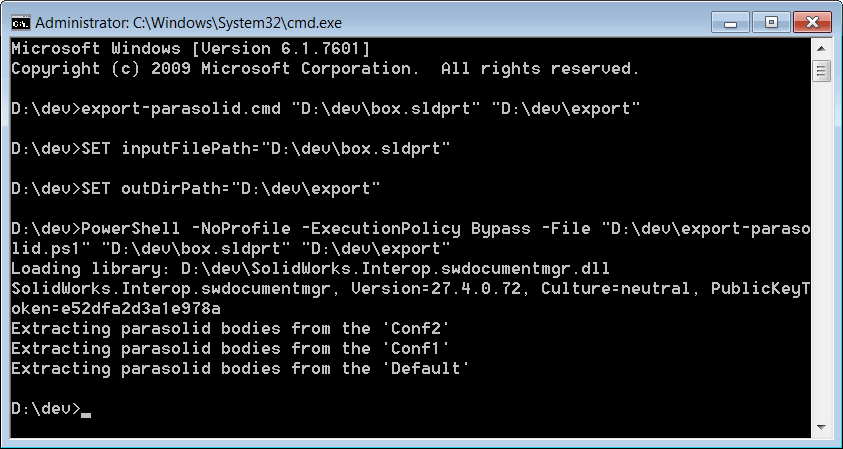Export part to Parasolid via Document Manager API (without SOLIDWORKS)
This PowerShell script allows exporting the SOLIDWORKS part file into the parasolid format (.xmp_bin) from the command line using SOLIDWORKS Document Manager API
This file can be opened in any compatible CAD application (SOLIDWORKS, Solid Edge, etc.)
This script doesn't require SOLIDWORKS to be installed and doesn't consume SOLIDWORKS license.
Configuration and usage instructions
- Create two files and paste the code from the below snippets
export-parasolid.ps1
$inputFilePath=$args[0]
$outDirPath=$args[1]
$ScriptDir = Split-Path $script:MyInvocation.MyCommand.Path
$Assem = (
$ScriptDir + "\SolidWorks.Interop.swdocumentmgr.dll"
)
$Source = @"
Imports System
Imports System.IO
Imports SolidWorks.Interop.swdocumentmgr
Public Class Exporter
Const LICENSE_KEY As String = "Your license key"
Shared Sub New()
AddHandler AppDomain.CurrentDomain.AssemblyResolve, AddressOf OnAssemblyResolve
End Sub
Public Shared Sub LoadLibrary(ParamArray libs As Object())
For Each [lib] As String In libs
Console.WriteLine(String.Format("Loading library: {0}", [lib]))
Dim assm As System.Reflection.Assembly = System.Reflection.Assembly.LoadFrom([lib])
Console.WriteLine(assm.GetName().ToString())
Next
End Sub
Private Shared Function OnAssemblyResolve(ByVal sender As Object, ByVal args As ResolveEventArgs) As System.Reflection.Assembly
For Each assm As System.Reflection.Assembly In AppDomain.CurrentDomain.GetAssemblies()
If assm.GetName().ToString() = args.Name Then
Return assm
End If
Next
Return Nothing
End Function
Public Shared Sub ExportParasolid(filePath As String, outDirPath As String)
Try
Dim classFact As SwDMClassFactory = New SwDMClassFactory()
Dim app As ISwDMApplication = classFact.GetApplication(LICENSE_KEY)
Dim docType As SwDmDocumentType
Dim doc As ISwDMDocument = OpenDocument(app, filePath, True, docType)
If docType <> SwDmDocumentType.swDmDocumentPart Then
Throw New InvalidCastException("Only part documents are supported")
End If
Dim confNames As String() = CType(doc.ConfigurationManager.GetConfigurationNames(), String())
If confNames Is Nothing OrElse confNames.Length = 0 Then
Throw New NullReferenceException("No configurations found")
End If
If Not Directory.Exists(outDirPath) Then
Directory.CreateDirectory(outDirPath)
End If
For Each confName As String In confNames
Console.WriteLine(String.Format("Extracting parasolid bodies from the '{0}'", confName))
Dim conf As ISwDMConfiguration2 = doc.ConfigurationManager.GetConfigurationByName(confName)
Dim outFilePath As String = Path.Combine(outDirPath, String.Format("{0}_{1}.xmp_bin", Path.GetFileNameWithoutExtension(filePath), confName))
Dim err As SwDmBodyError = conf.GetPartitionStream(outFilePath)
If err <> SwDmBodyError.swDmBodyErrorNone Then
PrintError(String.Format("Failed to export parasolid body of '{1}' in '{2}'", confName, filePath), True)
End If
Next
Catch ex As Exception
PrintError(ex.Message, False)
End Try
End Sub
Private Shared Function OpenDocument(app As ISwDMApplication, filePath As String, [readOnly] As Boolean, Optional ByRef docType As SwDmDocumentType = SwDmDocumentType.swDmDocumentUnknown) As ISwDMDocument
docType = SwDmDocumentType.swDmDocumentUnknown
Select Case Path.GetExtension(filePath).ToLower()
Case ".sldprt"
docType = SwDmDocumentType.swDmDocumentPart
Case ".sldasm"
docType = SwDmDocumentType.swDmDocumentAssembly
Case ".slddrw"
docType = SwDmDocumentType.swDmDocumentDrawing
End Select
Dim err As SwDmDocumentOpenError
Dim doc As ISwDMDocument = app.GetDocument(filePath, SwDmDocumentType.swDmDocumentPart, [readOnly], err)
If doc Is Nothing Then
Throw New NullReferenceException(String.Format("Failed to open document: {0}", err))
End If
Return doc
End Function
Private Shared Sub PrintError(msg As String, isWarning As Boolean)
Dim color As ConsoleColor
If isWarning Then
color = ConsoleColor.DarkYellow
Else
color = ConsoleColor.DarkRed
End If
Console.WriteLine(msg)
Console.ResetColor()
End Sub
End Class
"@
Add-Type -TypeDefinition $Source -ReferencedAssemblies $Assem -Language VisualBasic
[Exporter]::LoadLibrary($Assem)
[Exporter]::ExportParasolid($inputFilePath, $outDirPath)
export-parasolid.cmd
SET inputFilePath=%1
SET outDirPath=%2
PowerShell -NoProfile -ExecutionPolicy Bypass -File "%~dp0export-parasolid.ps1" %inputFilePath% %outDirPath%
- Copy the SolidWorks.Interop.swdocumentmgr.dll into the folder where the above scripts are created. PowerShell script is based on .NET Framework 2.0 so the SOLIDWORKS Document Manager interop must target this framework. The dll can be found at: SOLIDWORKS Installation Folder\api\redist\CLR2\SolidWorks.Interop.swdocumentmgr.dll
Alternatively full path to interop can be specified as shown below. In this case it is not required to copy this dll into the folder with script files.
$Assem = (
"Full path to SolidWorks.Interop.swdocumentmgr.dll"
)
- Start the command line and execute the following command
> [Full Path To export-parasolid.cmd] [Full Path To Input SOLIDWORKS file] [Full Path to output directory]
As the result all bodies from all configurations of the file are exported to the specified directory (directory is automatically created if not exist). Output files are named as following: [original file name]_[configuration name].xmp_bin The process log is displayed directly in the console:
